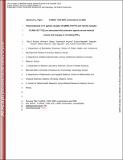Polymorphisms in Fc gamma receptor (FcγRIIIA-176 F/V) and Toll-like receptor (TLR9 [-1237 T/C]) are associated with protection against severe malarial anemia an...

View/
Publication Date
2012-10-08Author
Munde, Elly O
Okeyo, Winnie A
Anyona, Samwel B
Raballah, Evans
Konah, Stephen
Okumu, Wilson
Ogonda, Lilian
Vulule, John
Ouma, Collins
Metadata
Show full item recordAbstract/
Understanding the immunogenetic basis of naturally acquired immunity to
Plasmodium falciparum infection would aid in designing a rationally-based malaria vaccine.
Variants within the Fc gamma receptors (FcγRs) mediate immunity through engagement of
immunoglobulin (Ig) G and other immune mediators such as interferon gamma (IFN-γ),
resulting in erythro-phagocytosis and production of inflammatory cytokines in severe
malarial anemia (SMA). The toll-like receptors (TLRs) trigger transcription of pro-
inflammatory cytokines and induce adaptive immune responses. Therefore, these receptors
may condition malaria disease pathogenesis through alteration in adaptive and innate
immune responses. To further delineate the impacts of FcγRIIIA and TLR9 in SMA
pathogenesis, the association between FcγRIIIA-176 F/V, TLR9 (-1237 T/C) variants, SMA …
